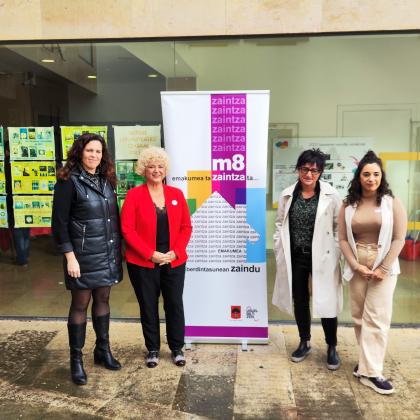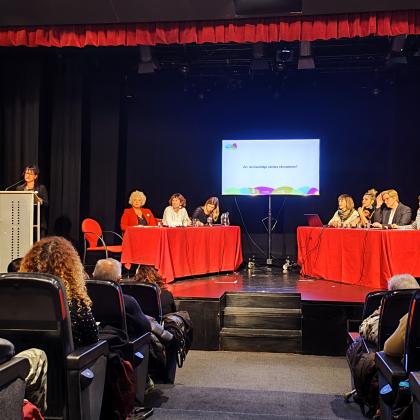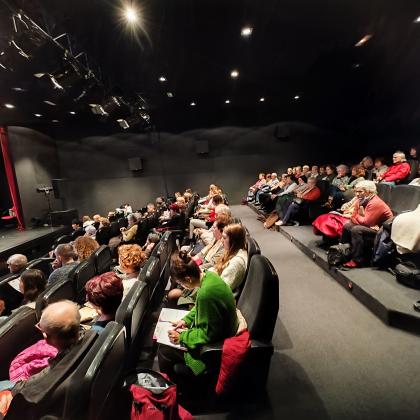- - This roadmap, which will be implemented from 2023, has been elaborated in a participatory manner counting for this purpose with the institutions, the care sector, members of the community, users and their families, and social agents.
- - Zaintza Azoka" has been the meeting point where the process of transformation of Usurbil's care model begins.
- - This transformation process is part of the "Zaintza Herri Lab" strategy of the Provincial Council of Guipuzcoa.
In Usurbil on November 19, 2022. It was in 2020 when the city council of Usurbil started the path for the collective construction of a new model of care. A new model that will favor a shared culture of social care, based on innovation and participation with a focus on People-Centered Care.
This model has been built in collaboration with institutions, the care sector, members of the community, users and their families, and social agents. Since its inception, it has been based on the development of local experience that helps to create a more personalized, flexible and community-based care model, based on social innovation, promoting home care and improving synergies between the social and health systems. Thanks to this collaboration we have established the keys for an innovative care model in the municipality of Usurbil.
The construction of the roadmap of the new care ecosystem has been carried out thanks to two participatory processes that took place in 2021 and 2022 that have been carried out from co-responsibility, participation and transversality, combining the different social sectors and areas of knowledge, in order to provide comprehensive and coordinated responses to caregivers and people who carry out the care and create safe and dignified contexts.
The presentation of the roadmap took place today in "Zaintza Azoka", the care fair in which all the agents that participated in this participatory process took part.
In the presentation of the fair, Agurtzane Solabarrieta, Mayor of Usurbil, stressed that "The engine of this participatory process has been the motor group. All these people and agents related to care have been represented in this group and during these months a deep reflection on care in Usurbil has been carried out" and that "we are currently in phase 2 of the participatory process, in the final stretch: based on the ecosystem of care that we have agreed in the first phase, we are going to define what we must transform the current model".
To conclude, Agurtzane Solabarrieta pointed out that "in order to implement the Roadmap it is essential and necessary at this time to tell everything we are working on, disseminate it and share it with the citizens and with all the people who are working in the field of care" "the future steps we are considering for the implementation of the Ecosystem of Care are: the opening of intergenerational housing and housing with care, cooperative innovation housing of reference throughout the State. Strengthening the social services team from the point of view of case management and the training of home care service workers to improve their working conditions and the integration of the person-centered care approach. Continue the commitment to the community role of care and the articulation of the community and neighborhoods within the care system with volunteer leadership."
The Usurbil care ecosystem is funded by the Provincial Council of Guipuzcoa and is part of the "Zaintza Herri Lab" strategy.
Maite Peña, Deputy for Social Policies of the Provincial Council of Gipuzkoa, highlighted the Usurbil care ecosystem, and pointed out that it is part of a "complete and extensive" strategy that is being developed in Gipuzkoa: "The future is to combine care with the community and social innovation, thus creating advanced ecosystems at the local level, throughout the territory".
Within the Zaintza HerriLab strategy, the deputy pointed out that there are currently 15 experiences underway in the territory, including the one in Usurbil. The Zaintza HerriLab strategy delves into the prevention of dependence and frailty, promoting personal autonomy and long-term care, and also offering support to caregivers. "We always say that we have our own way of acting in the social field in Gipuzkoa, with the collaboration and experience of the third sector, and in a consolidated system of social services and policies. Moreover, with a great capacity for transformation and adaptation", she added.
To conclude, the provincial deputy emphasized that each care ecosystem has its own peculiarities, but that they all follow the same objective: to offer personalized, innovative, participative and community-based care. She also pointed out that Gipuzkoa is experiencing an "exciting" moment: "We are on the right track, there is still a long way to go, but little by little, we are making change visible thanks to the work of all of us, as is happening in Usurbil", concluded Maite Peña.
The whole process of generating the Usurbil care ecosystem has been accompanied by Matia through its research institute. Irati Mogollón, principal investigator of the project, emphasized that "In the creation of this ecosystem there are fundamentally some principles, such as participation, inclusiveness, the construction of a caring people. Among them there is one that we would like to highlight: co-responsibility. To the extent that we are all responsible for monitoring, it is necessary to promote meeting places such as today's. In the construction of new ecosystems, we are all responsible for the care of the ecosystem. In the construction of new ecosystems, we all have something to say and something to participate in, both from the point of view of awareness, technical support and scientific innovation. Together, as a community, we will build the Ecosystems of Care."



